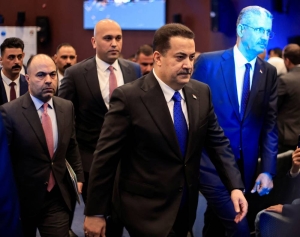Chinese companies among winning bids to explore Iraq oil and gas fields


Iraqi Prime Minister Mohamed Shia al-Sudani and Oil Minister Hayan Abdel-Ghani attend the fifth-plus and sixth licensing rounds for 29 oil and gas exploration blocks at the Oil ministry’s headquarters in Baghdad yesterday.
Iraq was holding an oil and gas licensing round for 29 projects yesterday in a bid to develop its huge gas reservoirs to help power the country and lure billions of dollars in investments.
The exploration blocks are spread across 12 governorates in central, southern and western Iraq and for the first time include an offshore exploration block in Iraq’s Arab Gulf waters.
Five fields were won by Chinese companies. Zhongman Petroleum and Natural Gas Group (ZPEC) took the northern extension of the Eastern Baghdad field, in Baghdad, and the Middle Euphrates field that straddles the southern Najaf and Karbala provinces, the oil ministry said.
China’s United Energy Group Ltd won a bid to develop the Al-Faw field in southern Basra, while ZhenHua won a bid to develop Iraq’s Qurnain field in the Iraqi-Saudi border region and Geo-Jade won a bid to develop Iraq’s Zurbatiya oil and gas field in the eastern Wasit.
Two oil and gas fields were taken by Iraq’s KAR Group — the Dimah field in eastern Maysan province, and the Sasan & Alan fields in Iraq’s northwestern Nineveh province — the oil ministry said.
Iraq, Opec’s second-largest producer after Saudi Arabia, last held a licensing round, its fifth, in 2018.
The “fifth plus” licensing round includes many projects left over from that round plus a new sixth round with 14 projects, Iraqi Oil Minister Hayan Abdel-Ghani said.
More than 20 companies pre-qualified for the latest round, including European, Chinese, Arab and Iraqi groups. There were no US oil majors involved.
Iraq’s oil production capacity has grown from 3mn to around 5mn barrels per day (bpd) in recent years, but the departure of giants such as Exxon Mobil Corp and Royal Dutch Shell Plc from a number of projects due to poor returns means future growth is uncertain.
Developments have also slowed due to growing investor focus on environmental, social and governance criteria.
Iraq at one time had targeted becoming a rival to top global producer Saudi Arabia with output of 12mn bpd or over a tenth of global demand.

